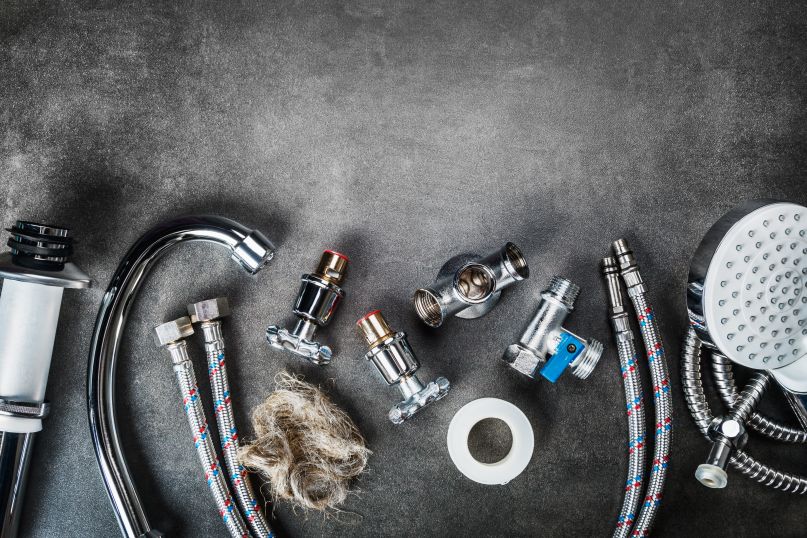If you’re thinking of a career in plumbing, the salary might turn out to be the deciding factor. To become a plumber, pipefitter or steamfitter, you don’t need a degree, so student loans won’t be a problem. Is the average plumber salary good?
The Average and Median Plumber Salary – Fresh Figures
The latest figures from the Bureau of Labor Statistics show that the average plumber salary was $63,350 in 2021. The median was slightly lower at $59,880. The hourly wage was about $29. not too shabby at all! Of course, your earnings will depend on factors such as your experience and employer.
For example, plumbers working as building equipment contractors earned a mean wage of $63,900. Those employed in the local government made $57,340, while those in pipeline transportation of natural gas had an average salary of $78,450.
The top paying industries for plumbers, pipefitters and steamfitters were:
- petroleum and coal products manufacturing ($91,450);
- electric power generation, transmission, and distribution ($91,240);
- pharmaceutical and medicine manufacturing ($89,700).
All in all, plumber salaries vary a lot. The lowest-paid 10% made an annual wage of $36,700 or less. The highest-paid plumbers earned $99,920 or more per year. If you’re thinking of a career in plumbing, consider your options carefully to make the most of your skills.
Plumber Salaries over the Years
Have plumber salaries increased over the years? In short, yes, but only a little.
- In 2010, plumbers earned a median wage of $46,660, which is equal in purchasing power to $57,983 in 2021.
- By 2015, the median plumber salary increased to $50,620. This is the equivalent of $57,871 in 2021.
- In 2020, the middle-earning plumbers made a salary of $56,330. This is equal to $58,976 in 2021.
- In 2021, the median salary for plumbers was $59,880.
As you can see, plumber salaries have increased steadily over the past decade, but not by a huge amount if you adjust the numbers to inflation.
The Average Plumber Salary – Top-Paying and Lowest-Paying States
Salaries vary depending on the state a plumber lives and works in. This might be due to the cost of living, the availability of jobs or the industry a plumber works in – some industries are more developed in certain states, providing better career opportunities.
The top five states with the highest average plumber salary in 2021 were:
- Illinois – $86,200;
- Alaska – $85,300;
- Massachusetts – $84,090;
- New Jersey – $82,740;
- Oregon – $81,470.
Is your state on that list? If not, chances are, you can still make a pretty decent wage. The lowest plumber salaries were reported in Arkansas ($45,440), Mississippi ($47,430), South Dakota ($47,460), Alabama ($47,470), and Florida ($48,120). However, this doesn’t mean that plumbers in those states are necessarily poorly paid, as the cost of living is lower there than it is in the top-paying states.
The Plumbing Job Outlook from 2020 to 2030
The outlook for plumbers isn’t too bad, with the industry expected to grow by 5% from 2020 to 2030. This is slower than average, but even then, 51,000 new plumbing jobs are going to open each year.
What Does a Plumber Do?
A plumber is responsible for the installation, maintenance and repair of piping systems. This includes water supply, drainage, gas and heating systems. Plumbers also install fixtures such as sinks, toilets and bathtubs.
What Challenges Do Plumbers Face?
The job is physically demanding as it involves bending, stooping and lifting heavy objects. Plumbers often work in cramped spaces and may be required to work in awkward positions.
Plumbers typically work full-time, although some may choose to work part-time or on a contract basis. Many are self-employed. Since emergencies can happen at any time, plumbers will often work on call. This means they may have to work evenings, weekends or holidays.
Is a Career in Plumbing Right for You?
Do you have what it takes to be a plumber? Physical strength and stamina are important, as is manual dexterity. You’ll need to be able to follow instructions and have good problem-solving skills. If you’re interested in a career in plumbing, research the plumber salary in your state and see if it’s satisfactory for you.
Of course, your salary is just one part of the equation. You also need to consider other factors such as job satisfaction and work-life balance before making a decision. Plumbing can be a very rewarding career – both financially and emotionally.
What Are the Requirements to Become a Plumber?
If you’re interested in becoming a plumber, there are some things you need to know. First, plumbers typically need to have a high school diploma or equivalent. They must also complete an apprenticeship, which usually lasts four to five years. During that time, apprentices learn the trade and gain experience.
After completing their apprenticeship, plumbers must pass a journeyman’s exam to earn their license. Some states also require plumbers to take continuing education courses to stay up-to-date on the latest technology and methods. With enough experience, you can become a master plumber and make up to $98,000 per year.
The Bottom Line: Plumber Salaries are Decent
The plumber salary is nothing to scoff at. If you’re thinking of a career in plumbing, it’s definitely worth considering! With no need for a degree, plumbers can make a good wage without racking up student loans.




